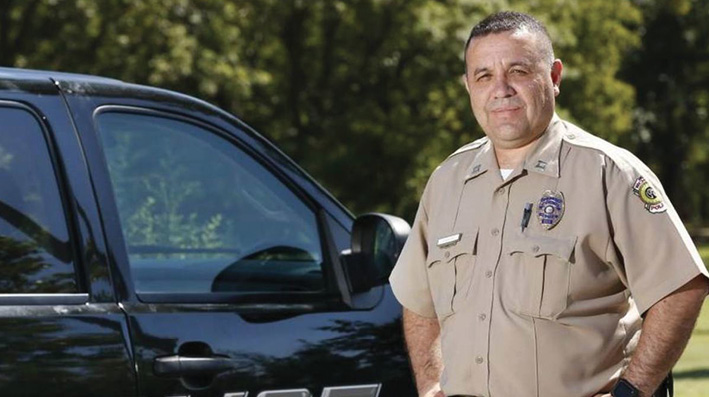
Photographs and framed certificates on an office wall often reflect what the occupant is proudest of, the service and accomplishments that helped shape them. For José Salcido ’94, this includes a certificate signed by former Wichita Police Chief Richard LaMunyon decades ago, thanking him for his service as a school crossing guard as a student at Wichita’s Park Elementary.
“I’ve kept it all these years,” says Salcido, pointing to where he hung the certificate when he moved into his fourth-floor office in Wichita’s City Hall in September after being promoted to deputy chief of the Wichita Police Department. Salcido’s promotion is significant in a couple of ways: Formerly an undocumented immigrant, he’s the city’s first Latino deputy police chief.
Salcido earned his promotion, by all accounts, because of many commendable traits, perhaps especially his eagerness to learn. As a student, he loved sitting at the front of a classroom – and earned three college degrees.
As a police officer, he relishes problem-solving and learning from other disciplines – and completed a root-cause analysis workshop with engineers to get a fresh perspective on dissecting policing problems.
He has always appreciated the mentorship and encouragement he’s received through the years. As an example,
he mentions Betty Thompson in Wichita State’s College of Health Professions, who taught him, among other things, patience and business meal etiquette at WSU’s University Club where she bought him his first steak dinner.
Born in 1971 in Santa Barbara, Chihuahua, Mexico, 9-year-old Salcido came with an older brother and two sisters
to Wichita where his mom had been working for at least a year. He took to things that had duty and discipline. He wanted to be like the cops he pestered for Kansas City Chiefs trading cards in his neighborhood or serve in the military, but it didn’t seem likely for the young boy who came to America knowing only the words shut up and necklace in English.
“I didn’t have my residency card,” he says. “As luck would have it, Ronald Reagan passed the amnesty law (the Immigration Reform and Control Act of 1986) so the possibilities opened up to become a citizen.” After becoming a legal resident, he enlisted in the Kansas Air National Guard during his senior year of high school and became a medic. When he realized a degree would help advance his career, he went to WSU, earning a bachelor’s degree in Spanish. He initially took health courses, thinking he might go on to earn a medical degree.
He became a U.S. citizen in 1995, opening the door for him to become both an officer in the military and to earn a spot in Wichita’s police academy. In 2015, he retired from the Kansas Air National Guard’s 184th Medical Group at the rank of major after a 26-year career that included service in Desert Storm and the global war on terrorism.
When Salcido decided to pursue graduate education, he figured an MBA degree, which he earned in 2004 from Baker University, would benefit him as a crime-solver and an administrator.
“If we approach a lot of crime like a business, where you get a better return on investment for your officers’ time, you can be more efficient using taxpayers’ money to get the job done,” he says.
The statistics and probability analysis skills he learned helped him and his officers bring an end to a spree of 10 bank robberies when he noticed a correlation between stolen cars used in the robberies and how the robberies were carried out.
For his third degree – a Master of Military Operational Art and Science from the U.S. Air Force Air Command and Staff College, which he earned in 2015 – he compared the situations of foreign governments such as Afghanistan that have legitimacy problems in fighting counter-insurgency and why American police lose legitimacy in minority neighborhoods. As part of his research, he studied the riots in Ferguson, Mo., and he read the Kerner Commission’s report on the causes of the 1967 race riots.
When Salcido took his new job, he told reporters that he knew his appointment would send a message. He knows that a police force needs to reflect the community it polices. “Diversity is where you get your strength,” he says. “Often the best way to connect with an individual is because you share like experiences.”
He also realizes his personal story and this year’s WPD promotion send another message: that if you work hard and set goals, you can achieve them.
And if that certificate of appreciation in his office is any indication, it’s small acts of acknowledgment that can set one on a path to making history.





